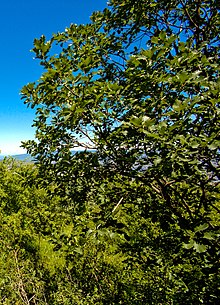Quercus macranthera, commonly called the Caucasian oak, or the Persian oak, is a species of deciduous tree native to Western Asia (northern Iran, Turkey; and in the Caucasus in Georgia, Armenia, and Azerbaijan)[1] that is occasionally grown as an ornamental tree in Europe growing to 30 metres (98 feet) tall.[2] It is placed in section Quercus.[3]
| Caucasian oak | |
|---|---|

| |
| Scientific classification | |
| Kingdom: | Plantae |
| Clade: | Tracheophytes |
| Clade: | Angiosperms |
| Clade: | Eudicots |
| Clade: | Rosids |
| Order: | Fagales |
| Family: | Fagaceae |
| Genus: | Quercus |
| Subgenus: | Quercus subg. Quercus |
| Section: | Quercus sect. Quercus |
| Species: | Q. macranthera
|
| Binomial name | |
| Quercus macranthera | |
| Synonyms | |
|
List
| |
Subspecies
editIt has two subspecies. One subspecies (Quercus macranthera subsp. syspirensis) is found in the thermophilic lower- and mid-montane shrub communities of Turkey, and the other subspecies (Quercus macranthera subsp. macranthera) is found in Georgia, Armenia, Azerbaijan and northern Iran, along the Caspian Sea.
References
edit- ^ a b Bull. Soc. Imp. Naturalistes Moscou 11(2):259. 1838. "Quercus macranthera". Germplasm Resources Information Network. Agricultural Research Service, United States Department of Agriculture. Retrieved July 19, 2010.
- ^ Mitchell, A.; Wilkinson, J. (2001). Trees of Britain and Northern Europe. Collins.
- ^ Denk, Thomas; Grimm, Guido W.; Manos, Paul S.; Deng, Min & Hipp, Andrew L. (2017-11-02). "Appendix 2.1: An updated infrageneric classification of the oaks" (xls). figshare. Retrieved 2023-02-17.